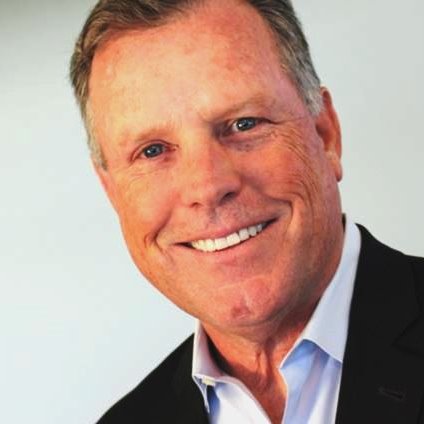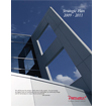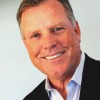
There’s a lot of talk about the advent of a “knowledge economy” and the demand for “knowledge workers,” but the reality is that a practical system to acquire and apply knowledge has long been essential to achieving one’s personal and professional goals.
Access to knowledge is certainly not a problem. We are inundated with information. By the estimates of one scientific study [link: http://www.dailymail.co.uk/sciencetech/article-1355892/Each-person-inundated-174-newspapers-worth-information-EVERY-DAY.html], people are surrounded by the equivalent of reading 174 newspapers from front page to back every day. But there’s a big difference between data and knowledge—especially the type of knowledge we need to attain the better future we envision for ourselves—and another leap to applying that knowledge in productive ways.
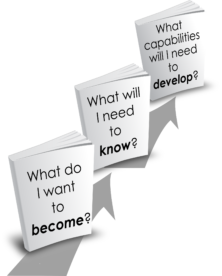
Whatever you plan to accomplish, whatever vision you have for who you want to become, a solid first step is to assess what types of knowledge you will need to progress in that direction. It might be helpful to think of the types of know-how you need to develop as individual bookshelves in your aspirational library. Then you can start building your library of what you’ll need to know and who you’ll need to know to help develop your skill sets and expertise (more on that who in a bit). This concept of who you want to become—your better future—doesn’t need to apply solely to your business endeavors but can extend to your personal pursuits and social life as well.
When I set my sights on becoming a CEO, I realized I would need to develop my knowledge base and gain experience in the areas of leadership, strategy, communication, and finance. Wellness was and remains a personal goal that coincides with my professional endeavors: Leadership requires a lot of energy, and I want to stay fit so that I can thrive at work and be active back home on the ranch as well. As a result, current advice about physical fitness and nutrition occupies another bookshelf in my library.
This systematic approach has worked for me in identifying, gathering, processing, and applying knowledge that has been fundamental in working toward my own better future
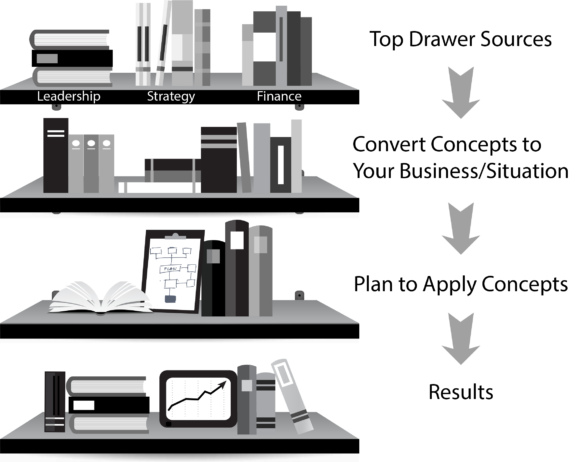
Apply a Discerning Eye in Your Quest for Knowledge.
Whose ideas do you find most relevant and useful? Many, many books have been written about business strategy. I’ve read a lot of them. Among all of them are a half-dozen books that really resonate with me and that I’ve found helpful enough to return to time and again. These are the resources that anchor my strategy bookshelf. I’d rather have a deep, working understanding of the core concepts from four or five seminal works rather than a passing familiarity with 15 or 20 books on a given topic.
Even among these anchor books, I have one favorite: Peter Drucker’s The Five Most Important Questions You Will Ever Ask About Your Organization [link: https://www.amazon.com/Five-Important-Questions-About-Organization/dp/0470227567/ref=sr_1_1?ie=UTF8&qid=1470857038&sr=8-1&keywords=drucker+five+most+important+questions]. I have a personal connection—Drucker was lecturing at Claremont College when I was studying for my master’s degree in business management there. More to the point, I have found the strategic principles shared in this book to be absolutely top drawer. We used Drucker’s five questions as a framework for strategic planning soon after I become CEO of Partners Federal Credit Union, and the plans we developed helped the credit union move from reporting solid results to being a top decile performer.
Keep in mind as you acquire knowledge that some information and ideas are more enduring than others. For example, you need to know how to use the most practical apps on your smartphone to make the best use of your time, but if recent history is any indication, you’ll be learning a whole new set of productivity tools within a couple years. In my field of financial services, topics like new payment systems as potential disruptors and the future of bitcoin are hot topics, so I stay current by listening to podcasts, reading online articles, and attending conference sessions. These topics and skill sets will either become commonplace or fade with time. They have real, but perhaps short-term, value. Think of this area of information gathering as “just-in-time knowledge.”
On the other hand, developing capabilities to identify and implement strategy is an example of enduring knowledge that requires a commitment over time to master. By pinpointing these “big domains,” you can more effectively decide how to allocate your time to study, learn, and apply that knowledge over the long term and with increasingly more effective results.
Identify Your Go-To People.
Once you have identified your big domains, cast a wide net for useful resources, not just books and business journals, but lectures, conferences, podcasts, and discussions with people who have succeeded in the same arenas where you aspire to excel. I find “field interviews,” conversations with knowledgeable individuals, to be extremely rich. I go up to speakers at lectures and ask follow-up questions so I can more directly apply the information they are sharing to my circumstances, or I might contact them later with specific questions. I have in-depth discussions with colleagues at conferences. I contact the authors of books that I’ve found helpful.
My goal is to develop relationships with these people so that I might have ongoing access to the insights of subject matter experts. If I get stuck on a problem, who can I bounce ideas off of? Who can I turn to for inspiration? Who might offer informed perspectives from different angles? Who will provide honest, useful feedback? In effect, I am building a “mastermind” group to support my progress in each big domain.
Another objective through the pursuit of knowledge in conversation with selected others is learning together. As the title of a recent Harvard Business Review article [link: https://hbr.org/2016/01/we-learn-more-when-we-learn-together] suggests, “We Learn More When We Learn Together.” By purposefully sharing information and ideas, everyone gains.
My book Doing What Matters conveys a related key concept in business problem solving—the need to take a 360-degree view in information gathering. Find out how people inside and outside the organization view the issues in question, how frontline employees and managers view challenges the organization faces both internally and externally, and what qualitative evidence and quantitative data are available to refine these viewpoints. The viewing points matrix shared here illustrates the inside-out, outside-in, and qualitative/quantitative scope of knowledge acquisition through some common examples of both print and person-to-person data gathering.
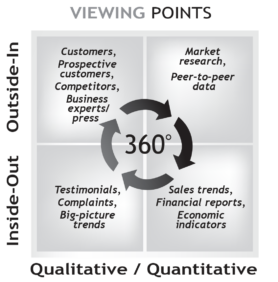
Make a Plan. Follow the Plan.
You can’t learn everything at once. Ambitious goals are accomplished through the acquisition and application of a lifetime of knowledge. What you can do is develop a timeline to chart where you are now and what you need to gather and learn along the way. Looking at the knowledge you need to develop over months and years is a lot less daunting than feeling that you need to know everything right now.
Your goal is to develop a working knowledge of high-level concepts adapted to your business or situation. Knowledge applied is what really makes a difference. It doesn’t matter how many books you’ve read, conference sessions you’ve attended, or podcasts you’ve heard if you don’t process what you’ve learned, apply it in your work and personal life, and keep it organized so you can return to the content when you need it.
A great deal of applying knowledge lies in making connections. You run across a problem and have this vague recollection of a possible solution you encountered in your reading or conference-going. The difference between success and frustration lies in your ability to track down the right resources when you need them.
Toward that end, I maintain a running list of useful books, articles, videos, and podcasts with 1–5 star ratings and notations about possible future uses (link). I also write book/resource reviews about the most helpful sources I run across along with a quick summary for future reference. For example, I wrote a review of the book The Granularity of Growth to share with my executive team [link: http://theceocorner.com/book-review-the-granularity-of-growth/] The process of writing a book review helps me think about the major concepts and apply them to my life and profession. And when I’m trying to bring together different ideas and information to tackle a tough problem, I can look back on this list and recent book reviews to jog my memory about the most useful resources.
As I mentioned in a previous article [link: http://theceocorner.com/journaling-can-help-soak-up-opportunities/], I also process what I’m learning as I read and converse with subject matter experts by jotting summaries and diagrams in my journal. Capturing key ideas in writing and drawing graphical representations of how those ideas connect to my work and life help me more fruitfully apply the knowledge that flows around me every day.
Look for Results, and Monitor Your Progress.
A concrete way to assess the usefulness and relevance of the information you’re gathering is to consider the bottom line. Does the author/speaker share the results of this approach or system? How might those results translate to your organization or situation?
As you adapt and implement these ideas and before you apply your newfound knowledge, it will be helpful to decide up-front how you will know whether this approach is working for you and whether you might need to make further adaptations—or pursue additional information—along the way. The pursuit of knowledge is invigorating in its own right, but outcomes matter.
In what directions will your newfound knowledge take you? Use this summary table as a guide.
My Better Future
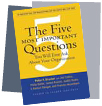
IDEAS Tune into top drawer information
- Whose ideas are most relevant and useful?
- Which resources are top drawer?
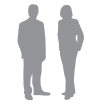
PEOPLE Consult subject matter experts
- Who are the people behind the ideas?
- How can you develop relationships for access to their subject matter expertise?
PLAN Develop a system to implement newly acquired knowledge
- How can you apply key concepts to your business/situation?
- How can you implement these new ideas most effectively?
- What’s your timeline?
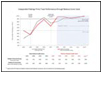
RESULTS Monitor the results of implementing your plan
- What results have others seen from implementing these ideas?
- How do those results compare with your experience?
- How can you adapt your plan to improve?
- Do you need more information (see Row 1)?

